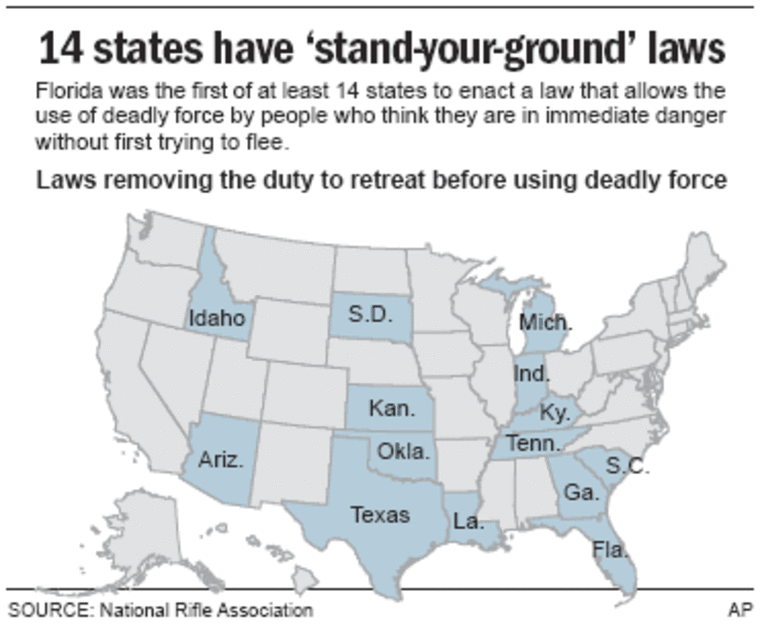Norman Borden fought back twice — once against three assailants on the street, then again in a courtroom where he was charged with murder for killing two of them.
Borden, 44, was walking his dogs last year when three men in a Jeep tried to run him down. He pulled a gun and shot five times through the windshield, then moved to the side of the vehicle and fired nine more rounds.
He thought the shooting was self-defense, but a prosecutor put him on trial in the deaths, despite a new Florida law that grants wide latitude to people using deadly force to protect themselves.
The case highlights the confusion surrounding so-called “stand-your-ground” laws, which have been adopted in at least 14 states. The laws have perplexed judges and prosecutors, and, in some cases, forced attorneys to change the way they review evidence.
In Borden’s case, a prosecutor filed charges against him, even though he privately thought Borden might have been correct to open fire.
In Kentucky, a man suspected of murder was offered a plea agreement because the law was too difficult to explain to jurors.
'An innate human right'
Florida was the first state to enact such a law in 2005, removing the requirement that people who think they are in immediate peril must first try to retreat from the confrontation before using deadly force. Prior to passage of the law, only people defending themselves in their own homes, for the most part, could use deadly force without first trying to flee.
Most states let authorities determine whether deadly force was reasonable, even inside the home. But the new laws create an automatic presumption that a person is justified in using deadly force to ward off an attacker in just about any public place.
“We believe that self-defense is an innate human right and the law should never put the innocent victim of a crime in a position of having to second-guess themselves,” said Ashley Varner, a spokeswoman for the National Rifle Association, which pushed for the laws.

For defense attorneys, the laws offer protection to clients who have struck back at assailants.
“The more defenses the better,” said Jack King, spokesman for the National Association of Criminal Defense Lawyers. He added: “Most people would rather be judged by 12 than carried by six,” referring to juries and pallbearers.
14 states adopt new rules
Gun-control groups worry that the laws will embolden shooters to pull the trigger first rather than as a last resort.
“If you are protecting yourself or your family in self defense, that’s a basic legal right anyway,” said Elizabeth Haile, an attorney for the Brady Campaign to Prevent Gun Violence.
At least 14 states have revised their laws to ensure that people don’t have to retreat from an attacker. Those states are: Arizona, Florida, Georgia, Indiana, Idaho, Kansas, Kentucky, Louisiana, Michigan, Oklahoma, South Carolina, South Dakota, Tennessee and Texas, according to the NRA.
There is no way to tell exactly how many times the law has been used as a defense because the statutes are still too new to collect statistics.
Too confusing to explain?
In Kentucky, prosecutors offered a plea deal to a man they accused of murder because the statute was too confusing to explain to jurors.
Judge Sheila Isaac, who presided over the case, said the law apparently “went right through the Legislature without a single attorney looking at it.”
She said the law was addressing a problem that didn’t exist, a sentiment shared by law enforcement officials across the country.
“You just don’t see cases where people are prosecuted when they are defending themselves,” Isaac said.
'So careful'
Former Republican state Rep. Dennis Baxley, who sponsored Florida’s bill, argues that the law was needed to empower citizens.
“Our judicial system tries to be so careful to protect the criminal’s rights, we have neglected the right of the common citizen to protect themselves,” Baxley said.
In West Palm Beach, Borden faced up to life in prison without the possibility of parole if convicted of murder and attempted murder.
One of his would-be attackers, 21-year-old Juan Mendez, admitted in testimony at Borden’s trial that the three men in the Jeep planned to “rough him up.” A baseball bat was also found in the vehicle.
Prosecutor Craig Williams argued that Borden exceeded justified force when he continued firing after shooting the driver and stopping the Jeep. But Borden’s defense argued that he did not have to retreat, citing the new law.
Williams said he pursued the charges because he thought a jury needed to decide the case. But he privately wondered how he would have behaved in the same situation. When Borden was acquitted, the prosecutor was almost relieved.
The assailants “were bringing an arsenal,” Williams conceded after the trial. “It was pretty clear what the right thing to do was here.”
